|
|
|
History of
American and Canadian Football |
|
American Football
Folk Football was probably played in the USA from
colonisation but it was not till 1867 that the first set of rules was drawn up
by Princeton College. These rules were similar to soccer. On the 6th November
1869 Rutgers and Princeton played a game which has become known as the first
game of American Football. On the 26th September 1969
the USPS issued a stamp commemorating the game. |
|
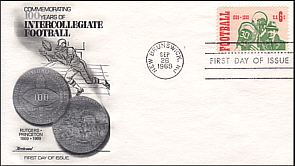 |
|
Over the next few years more colleges became interested in
playing competition football and in 1876 the Intercollegiate Football
Association was formed. It comprised representatives from Princeton, Yale,
Harvard and Columbia. Harvard and McGill (from Canada) played a rugby type
football and this was the type of football that dominated. |
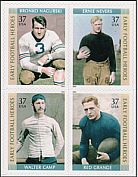 |
Walter Camp the Coach of Yale was instrumental in modernising
the game in 1880. He reduced the number of players to eleven, introduced the
quarterback, the series of downs and the scrummage of Rugby was changed to
the scrimmage of American Football. He became known as "The Father of
American Football."On 8th August 2003 USPS
issued four stamps commemorating Early Football Heroes. Walter Camp is shown
at bottom left. Other heroes are Bronco Nagurski of Minnesota and the
Chicago Bears, Enersest Nevers of Stanford and the Chicago Cardinals and Red
Grange of the university of Illinois and the Chicago Bears. |
|
By the early 1900's it was becoming obvious that the game was too
dangerous with 18 deaths in 1905. This led to the introduction of the forward
pass and now the game had evolved totally from Rugby. It was however not until
1913 that famous Notre Dame Coach,
Knute Rockne,
took full advantage of the forward pass. (On the 9th March 1988 a
commemorative stamp was issued.) He became a legendary Coach and in 1924
his backline was nicknamed the "Four Horseman" because of their speed in a
win over an Army team. As part of the "Celebrate the Century" series USPS
issued the commemorative stamp for the 1920s. |
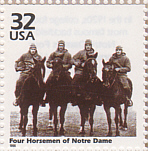 |
|
Another great coach of the early 20th Century was Pop Warner. He coached over
49 years and at seven Colleges. He coached 47 All Americans including the great
Jim Thorpe. Pop Warner was one of four coaches commemorated on a set of four
stamps (see below) issued in 1997. |
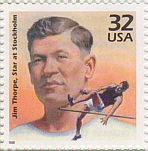 |
Jim Thorpe
was one of the greatest athletes of the 20th Century. At the 1912 Stockholm
Olympics he won both the Decathlon and Pentathlon. He played 6 years of
major League baseball and as well managed to lead the Canton Bulldogs
football team to unofficial world championships in 1916, 1917, and 1919. He
eventually finished his playing days in 1928 with the Chicago Cardinals.
He was initially honoured on a stamp issued on the 24th May 1984 in his
football gear and as part of the "Celebrate the Century" series for the 1910s
as an Olympian. |
|
|
Another great coach of the early 20th Century was George Halas.
He coached from 1920 to 1967 and had 40 seasons at the Chicago Bears and
won 6 NFL Championships. George Calas was one of four coaches commemorated on
a set of four stamps (see below) issued in 1997. The
American Professional Football Association was formed in 1920 and became the NFL
in 1922. By the time of the first Draft in 1936 the Professional game was
beginning to become more important than the College game. In 1946 the All
American Football Conference was formed as a rival to the NFL. In 1950 the two
leagues merged and for the next three seasons were known as the American and
National Conferences. In 1953 this was changed to the Eastern and Western
Conferences. In 1960 another league, the American Football League was formed. In
1966 for the first time the Champions of both Leagues met in the
Super Bowl. |
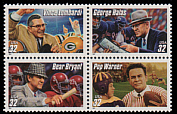 |
In the 1960s the dominant team was
Green Bay Packers.
They were coached by Vince Lombardi (shown at left as part of the
1997 Coaches Issue) from 1959 to 1967 and won 5 NFL titles and 2
Super Bowls in 1967 and 1968.Professional Football
was becoming huge business mostly supported by the TV networks. In 1970
Monday Night Football commenced. As part of the "Celebrate the Century" series USPS
issued the commemorative stamp for the 1970s. |
|
The last coach of the 1997 Series was Bear Bryant who had the highest wining
record of any Coach. He coached at 4 Colleges over 38 years till 1982. |
The dominant team of the 1970s were the Pittsburgh Steelers.
They won the Super Bowl in 1975, 1976, 1979 & 1980. As part of the "Celebrate the Century" series USPS
issued the commemorative stamp for the 1970s.
The dominant team of the 1980s and 1990s were the
San Francisco 49'ers. They won the
Super Bowl in 1982, 1985, 1989, 1990 & 1995. As part of the "Celebrate the Century" series USPS
issued the commemorative stamp for the 1990s. |
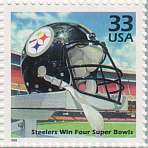 |
|
|
On the 16th July 2003 the small Pacific Island Nation of Samoa released a set of 5 stamps and a FDC
of Sporting Legends, including Jesse Sayolu, a Samoan, who played with
the San Francisco 49ers for 14 years. His career saw him play in 170 games
including 2 Pro Bowls and 4 Super Bowls. The Super Bowl is the most watched Football Game on the Planet.
Philatelic items are commonly produced such as this cover for
Super Bowl XXXVI.
The NFL celebrated its
75th Anniversary
in 1994. In 2003 it consisted of 32 teams with 16 in the AFC and 16 in
the NFC each Conference is divided into North, South, East and West Divisions of
4 teams..
Canadian Football
The first game was introduced to Montreal by a
British Army Garrison. In 1874 McGill played Harvard, a game which was in part
instrumental for the introduction of more Rugby like rules to America. In 1890
the Canadian Rugby Union was formed with teams in all four Provinces. |
|
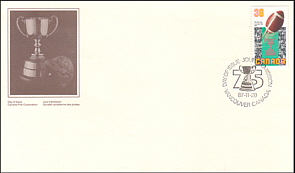 |
|
In 1909 the Governor General of Canada. Lord Grey, donated a
trophy called the Grey Cup. The above 1987 cover and stamp commemorated the
75th time the Cup had been decided. In 1956 the
professional competition became officially run by the CFL and the amateur game
by the CAFA which latter became Football Canada. From 1954 the Grey Cup
became exclusively for the Professionals.
Today their are 5 teams in the West Division and Four in the
East Division.
Canadian Football differs from the American Game in that their
is one extra player, the field is bigger, only three downs are allowed and
scoring is slightly different.
|
Australian Football and American Football
Kicking is the major skill required by AFL players
and it is no surprise that exceptional kicks are sought out by NFL clubs. Ex
Geelong Captain and 219 game veteran, Ben Graham, is playing the 2005 season
with the New York Jets. Ex
Brisbane (60 games) and Hawthorn (16 games) player, Nathan Chapman,
signed a contract
with the Green Bay Packers for 2004 but did not play any games. The major success story has been Darren
Bennett with the San Diego Chargers. He played 4 games with the West Coast
Eagles and 74 games with Melbourne. In 2004 he moved to the Minnesota Vikings
where he is playing in 2005.Perhaps the most
famous player was another Melbourne player, Jim O'Dea. He played for the Demons
from 1893-95 before moving to the University of Wisconsin to study Law. He was
such a successful long drop kick for field goals and conversions that it was
rumoured that he was responsible for the decrease in points for field goals from
3 points to 1. He made the 2nd and 3rd All American Teams in 1898 and 1899. He
latter held coaching positions at Notre Dame, Missouri and Stanford.
The first Brownlow Medalist, Edward "Carji" Geeves, who played
124 games for Geelong, was recruited by the University of Southern California as
a kicking Coach, in 1928. His students, the Trojans, increased their field Goal
Tally from 1 to 23 and won the championship.
Carlton Reserves player and Olympic High Jumper, Colin
Ridgeway, played one season with the Dallas Cowboys in 1965. |
|
|
|
|
|
|
|
|
|
|
|
|